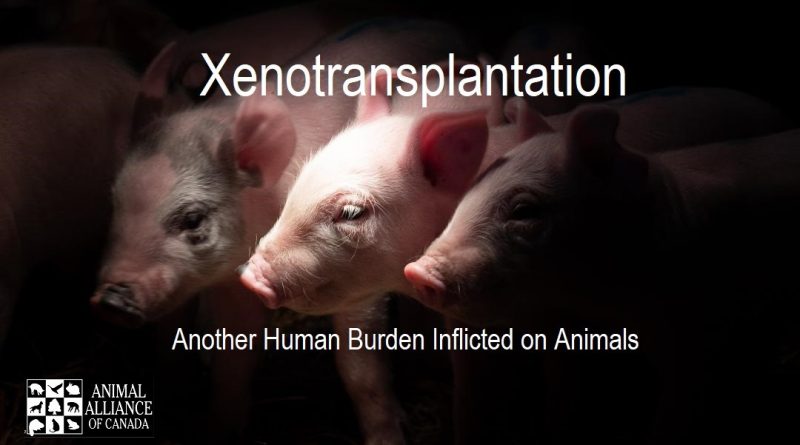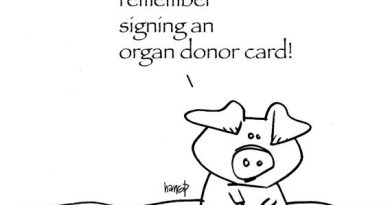Who Should Bear the Burden of Human Illness? Thinking About Xenotransplantation
| With a number of friends and family falling ill recently, I’ve been thinking (as I usually do) about the human health impact on non-human animals. Xenotransplantation is a procedure that introduces into humans the organs, cells, or tissues from non-human animals, forcing animals to be organ donors, likely resulting in the animal’s death. In January 2022, a genetically-modified pig was killed so that the animal’s heart could be transplanted into a man who was dying of heart disease. This human patient was not eligible to receive a human organ and so consented to this experimental surgery. About two months later the heart patient died. Nevertheless, this surgery is being celebrated in the scientific community because the pig’s heart was not immediately rejected after transplantation, and it performed essential functions for a time. In April I was interviewed for a local college newspaper on this topic. I explained that the controversy over xenotransplantation is not new. Over two decades ago, Animal Alliance actively participated in the public debate about the potential risks to the general public from zoonotic pathogens that might be transmitted to transplant recipients. Yet there have been extensive, ongoing efforts to genetically modify animals to make them suitable sources for substitute organs for human use despite ethical concerns and the growing knowledge of the dangers of pathogens jumping from animals to humans as we have seen with COVID-19. There is an enormous need for donor organs and other tissues to save human lives. It’s reported that each year more than 200 Canadians die waiting for an organ transplant. Each one of these deaths involves profound tragedy for the individuals and those who love them. These deaths and the suffering involved surely matter, and it’s understandable that efforts are being made to save these human lives. Animal advocates also experience illness and death, in our own lives and in the lives of those we love. We share that inherent will to live, to be healthy and to thrive. We too strive along with our friends and families to overcome illness and to extend life. We too look for treatments when injury or illness threatens our lives. Yet, there are ethical questions that we must ask. Are those species that are less powerful than humans no more than resources for our many uses, or are they beings with an inherent right to their own lives and bodies? And ultimately, whose responsibility is it to bear the burdens of our own human species? Does it fall on us, as members of our vast human family, to sustain each other and support our own vulnerable and sick? Or can we morally excuse ourselves for shifting away our own responsibility for one another onto non-human animals who are denied the ability to choose? And, what could we do to make more human organs available to those of us who need them? We know that Spain has a higher availability of organs from deceased donors because they have established a policy of ‘assumed consent.’ In Spain, one needs to establish that one does not wish to be a donor, as opposed to our Canadian system of needing to consent in advance of death to have one’s organs harvested. This means that Spain has far more organs from deceased humans available to save lives than here in Canada. Even in cases where there is established consent to donate organs prior to one’s death, in Canada it’s still common practice to seek a final consent from family members. There are too many cases of family members over-riding the prior consent to donate organs upon death. It’s understandable that the death of a loved one is a terrible time to be asked to make a difficult decision. The family member might be struggling to accept their loved one’s death, especially in the case of an accident. A family member might not have sufficient medical knowledge to understand the meaning of ‘brain-dead,’ thinking that the newly deceased could still recover. Yet, it’s likely that these same people would want an organ to be available for themselves or their loved one if a transplanted organ could save their life. We, as a nation, could decide to change our policies. We could demand that our legislators demonstrate political courage, even on sensitive subjects such as this. We can ask our legislators to adopt the policy of assumed consent that is practiced in Spain. We can be clear with our family members that we wish our tissues and organs to be harvested at the time of our own deaths. We can discuss organ transplantation with others, encouraging them to agree to have their organs harvested in the case of accidental death, and to allow the organs of their family members to be harvested as well. We can adopt a national policy of not asking family members for final consent in cases where prior consent of the newly deceased has been established. If we truly have such reverence for human life these decisions should not be so difficult to make. We can do a far better job of sustaining each other, of bearing each other’s burdens. We humans are ever-willing to take what is most precious to non-human animals – their very lives. We demand so much from animals, yet not nearly enough from ourselves. As a nation we don’t ensure that every Canadian has sufficient food, shelter, and medical care. We tolerate a shortage of hospital beds for our sick, and long-term care homes for our elderly. We allow poverty to go unaddressed, knowing that poverty is a significant contributor to disease and early death. We consistently fail to fund treatments for addictions and mental illnesses, resulting in vast numbers of Canadians unable to manage their own health. We allow our elected representatives to under-fund health services in our communities, leaving vulnerable people to deteriorate without care. As a global society, we claim that we value human life so greatly that we are justified to torment millions of animals each year in research laboratories. The numbers of animals who will be made to endure unnatural lives to be killed to provide transplant organs are far outnumbered by the monstrous number who suffer so greatly in research laboratories. Our supposed reverence for human life is used to justify horrors inflicted on animals for the sake of medical research, yet each year the population of homeless Canadians is allowed to grow larger. Thousands of Canadians don’t have their own doctor and the preventative care that they need to stay healthy. Too many children and their families rely on food banks. These failures of human compassion and social responsibility expose the hypocrisy of our claim to value human life so greatly. Yet, millions of research dollars are being spent to develop the field of xenotransplantation, expanding yet again the suffering that we inflict on animals. Whose responsibility is it to care for our fellow humans? Surely it is our own. As a former nurse, I know firsthand that we can do so much more to sustain and improve the lives and health of our own species through better social and economic policies. We will always strive to extend life, to cure illness, and ease human suffering. But it’s up to us humans to bear our own collective burdens, and to sustain each other and ourselves; as well as ease and eliminate the suffering of animals that is caused by humans. For the animals, Liz —– Liz White Executive Director Animal Alliance of Canada 416-462-9541 ext: 23 liz@animalalliance.ca |
From Animal Alliance of Canada, https://www.animalalliance.ca/



